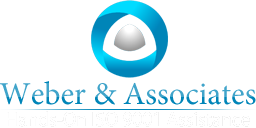FAQ'S
Frequently Asked Questions
Weber & Associates in Southaven, MS, is dedicated to providing with you everything you need to get an ISO 9001 certification. Below are a number of pertinent questions most often asked by our clients. To read the whole FAQ document in its entirety, click here.
-
What is ISO 9001?
It is an international standard for quality management. The standard is published by the International Organization for Standardization and is used throughout the world. For a company to become registered (certified) to the standard, it must pass an initial audit and then, to maintain the certification, it must pass periodic surveillance audits. The standard is generically written so it can be applied to all type of organizations.
In addition, there are industry-specific standards for automotive, aerospace, and medical companies that include either all or most of ISO 9001, plus additional requirements. Also, there is a standard for environmental management known as ISO 14001 and 13485 for medical devices; we specialize in all three of these standards.
-
What are the benefits?
Many companies are requiring that their suppliers to become certified, and many more prefer it. So it has tremendous marketing potential.
Internally, it can help an organization bring about continuous improvement, resulting in increased efficiencies and reduced costs.
-
But it is just for manufacturers, right?
No, both service companies and manufacturers have been certified. In fact, over the last few years most of the growth in ISO 9001 registrations has been with service organizations.
The standard is written so any organization can become certified.
-
What is involved in getting certified?
The biggest activity is documenting procedures. The 9001 standard itself requires only six; the rest are up to the organization to decide where they need them. Also during the process, the organization must establish and deploy a written quality policy. All employees must understand the policy. Quantifiable quality objectives are also required.
A very important part of implementation is internal audits of the system, including the processes you just documented. You can either perform these using your own trained staff, or these can also be conducted by an outside person.
The audit is usually followed by a management review of the system.
A formalized corrective and preventive action system is also required.
After the organization is confident all requirements have been met, it is ready for its external audits, which consist of a desktop review of the company documentation (usually called a Stage One or similar) conducted either on-site or off-site, followed by a comprehensive on-site audit where the system is actually verified as being implemented.
If you have questions about any aspect of ISO 9001 or the other standards mentioned above, please give us a call without any cost or obligation. We answer questions all the time and are happy to provide this free service.

